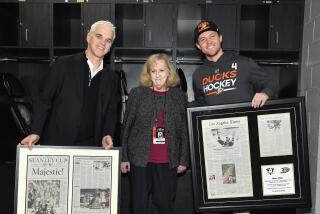Girl Problems in Op-Ed Land
- Share via
When the New York Times anointed Maureen Dowd as a columnist nine years ago, I gave her some terrible advice. I said, “You’ve got to write boy stuff. The future of NATO. Campaign spending reform. Throw weights. Otherwise, they won’t take you seriously.” The term “throw weights” had been made famous by a Reagan-era official who said that women can’t understand them -- whatever they are, or were. But clearly the term had bubbled into the man’s mind for reasons that many women understood better than he did himself.
Dowd wisely ignored me, and proceeded to reinvent the political column as a comedy of manners and a running commentary on the psychopathologies of power. It is the first real innovation in this tired literary form since Walter Lippmann. Eighty years ago, Lippmann developed the self-important style in which lunch with a VIP proceeds down the digestive track and emerges as a judicious expression of concern about developments in danger of being overlooked. Most of today’s columns are still variations and corruptions of this formula. But Dowd is different, and better.
So the question is: Did it have to be a girl? Or could a boy have built an Op-Ed career out of feelings and motives and all that ick? The question is pressing because of the current controversy over the number of women’s bylines on newspaper opinion pages. (Only one in five or so at the Los Angeles Times, even fewer at the Other Times and the Washington Post.) As the guy in charge of opinion at the L.A. Times, I have endured some horrendous insults, such as being compared to the president of Harvard.
Harvard President Lawrence H. Summers is in trouble for suggesting that inherent differences between men and women might be part of the reason there are so few women at the scholarly peaks of math and science. To be a university president, you are supposed to reject any such notion out of hand.
In the Op-Ed controversy, by contrast, talk of innate differences between men and women is not merely permissible: It is the very justification offered by some women (and deeply resented by others) for demanding more women’s bylines. Dowd declares a girlish reluctance to be mean, which she says she overcame, and she urges her sisters to play the boys’ game with the boys. The linguist Deborah Tannen pretty much shares Dowd’s analysis, but wants the mountain to come to Muhammad: Women shouldn’t have to adapt to the peacocky political culture created by men; the culture should learn from and adapt to women.
Meanwhile Dahlia Lithwick, writing in Slate, observes that this discussion has been all-girls so far and demands that the boys strip off their girlie coyness and jump right in. This is a terrifying invitation. Even the most testosteronic male commentator might be excused for deciding that developments in Uzbekistan really require his insights this week. In such circumstances, I always ask myself, “What would the president of Harvard do?” So I proceed.
It is hard to think of a hiring decision where sex or race ought to matter less than in choosing a professor of mathematics. That makes it a good focus for a discussion of meritocracy, reverse discrimination, innate abilities, cultural prejudice and so on. And it’s just too bad that Harvard seems incapable of allowing its president to participate in such a discussion.
By contrast, there cannot be many places where “diversity” is less a euphemism for reverse discrimination and more a common-sense business requirement than on a newspaper Op-Ed page. Diversity of voices, experiences, sensibilities are not about fairness to writers. They are about serving up a good meal for readers. Sure, it’s possible that a man might have come up with the Maureen Dowd formula that has so enriched the New York Times Op-Ed page. But in this busy world, diversity in the traditional categories of ethnicity and gender is a sensible, efficient short cut. Everyone involved should be trying harder, including me.
Newspaper opinion sections also want diversity of political views. In recent years that, frankly, has led to reverse discrimination in favor of conservatives. And an unpleasant reality is that each type of diversity is at war with the others. If pressure for more women succeeds -- as it will -- there will be fewer black voices, fewer Latinos, and so on.
Why should this be so? Aren’t there black women and conservative Latinos? Of course there are. There may even be a wonderfully articulate disabled Latina lesbian conservative who is undiscovered because she is outside the comfortable old-boy network. But there probably aren’t two. It’s not a question of effort, it’s mathematics. Each variable added to the equation subverts efforts to maximize all the other variables. You can seek out the best Japanese restaurant in town, or the best steakhouse. But if you want a Japanese steakhouse, you will have to settle for Benihana’s of Tokyo. Or something like that. Where is that Harvard math professor when you need her?
More to Read
Sign up for our Book Club newsletter
Get the latest news, events and more from the Los Angeles Times Book Club, and help us get L.A. reading and talking.
You may occasionally receive promotional content from the Los Angeles Times.










